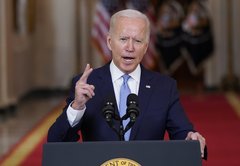End wars in Afghanistan and the Middle East
Joe Biden
"Biden will end the forever wars in Afghanistan and the Middle East, which have cost us untold blood and treasure. As he has long argued, Biden will bring the vast majority of our troops home from Afghanistan and narrowly focus our mission on Al-Qaeda and ISIS. And he will end our support for the Saudi-led war in Yemen."
Biden Promise Tracker

Compromise



